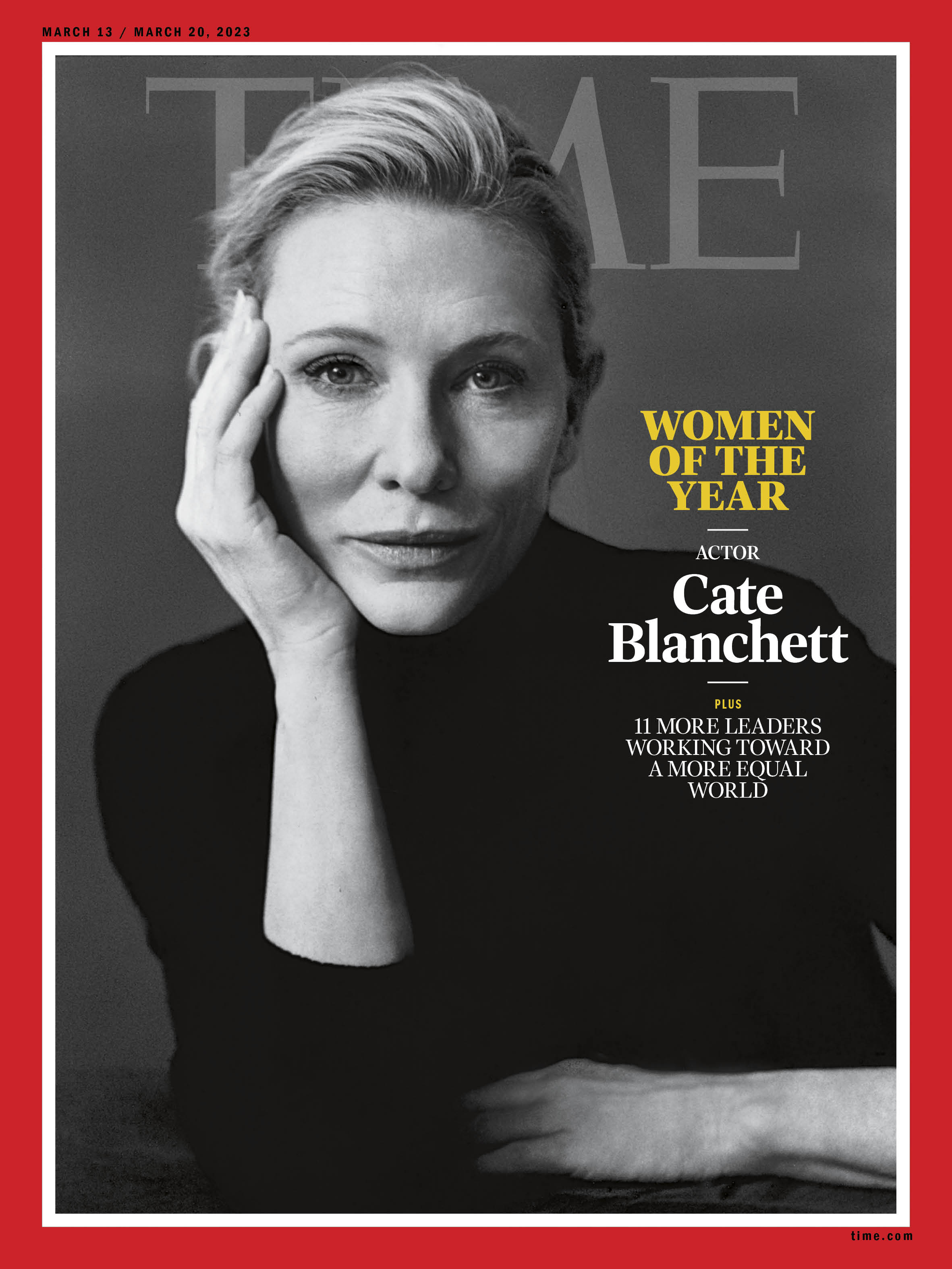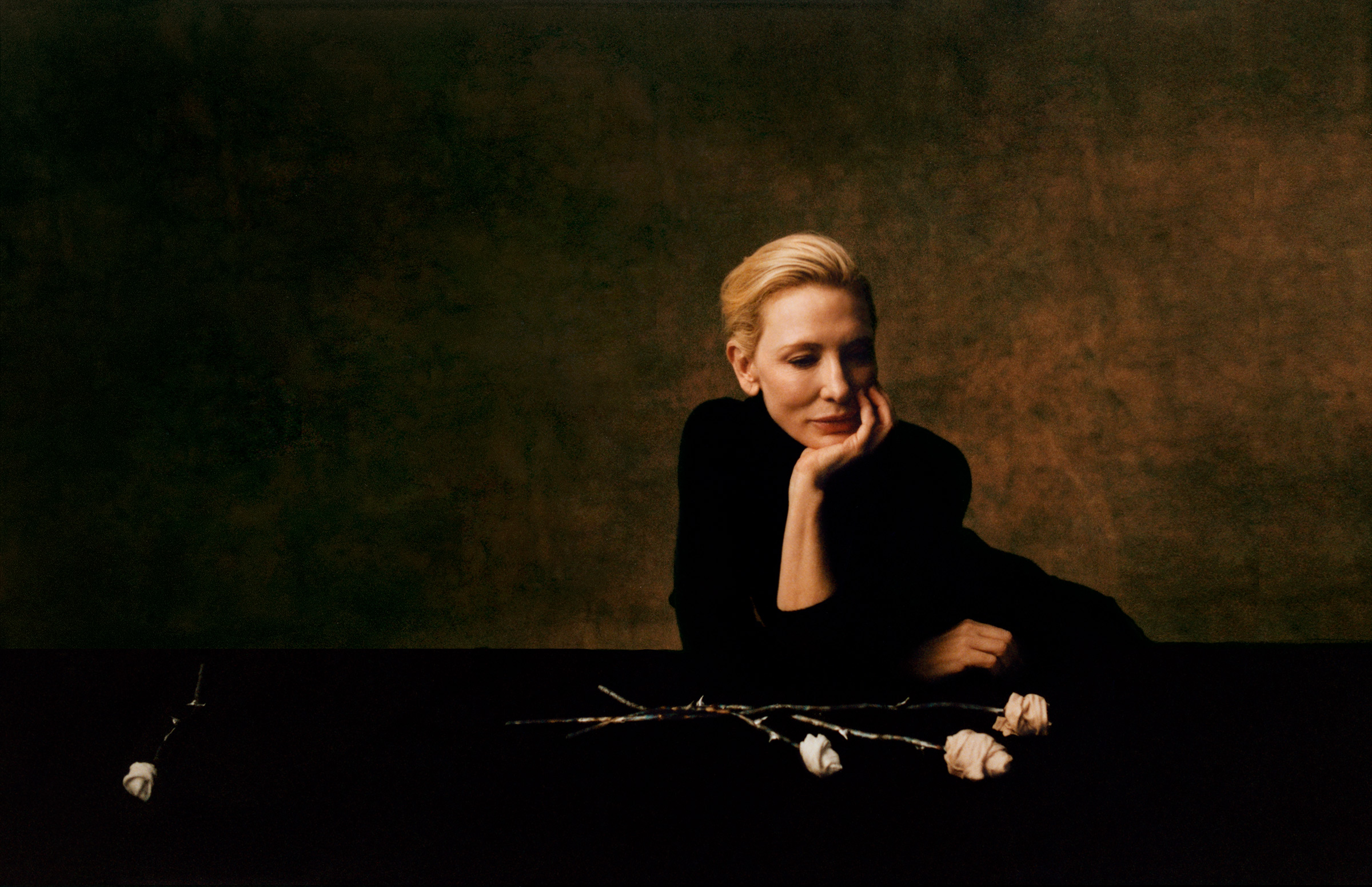When Cate Blanchett was around 5, she wrote a mini essay—saved for years by her mother and unearthed serendipitously during a recent move—envisioning her possible future as an adult: “When I grow up, I would like to be a man. I would still love my family. But I could light a fire and go to work. And when I’m bored being a man, I think I’ll just be me.”
Blanchett tells this story over tea in Los Angeles, amused by the kid logic behind it. Yet all those half-fanciful, half-practical dreams have come true for her, at least figuratively. She has played a man—more than one, in fact—in movies like Julian Rosefeldt’s dazzling 2015 Manifesto and (as the puckish troubadour Bob Dylan) in Todd Haynes’ 2007 I’m Not There. Though she seems to take on projects without a lull, in conversation it’s evident that even when traveling—she lives with her family in England—her thoughts stay close to home. A teenage son who’s looking at universities, a husband, Andrew Upton, with whom she runs the production company Dirty Films: family is her inner orbit, maybe even the sturdy gravitational pull that makes her work possible. And if you think she can’t light a fire—well, just look at her.

Buy a print of the Cate Blanchett cover here
For her role in Todd Field’s Tár as a top-class composer and conductor who negotiates the world on her own terms, Blanchett has been nominated for an Academy Award for Best Actress (her seventh nomination, and if she wins, her third Oscar). Blanchett’s Lydia Tár isn’t for you if you believe fictional characters, particularly women, ought to be role models. She’s gay, but that doesn’t make her nice. She achieves her overscale ambitions, but not without running roughshod over the women around her. Still, she’s magnificent.
Blanchett, 53, is drawn to multi-shaded characters who don’t court our approval—an all-time favorite is Ibsen’s compulsive manipulator Hedda Gabler, whom she’s played onstage—but Lydia Tár, in all her self-destructive glory and compelling unlikability, is like no one else we’ve ever seen onscreen. “We’re all imperfect creatures. And sometimes we don’t want to look at the unthinking, unintentional, inexplicable, ambiguous sides of being female,” Blanchett says. “We are brave, we are noble, we are generous, we are collaborative. But we are also the dark side of that, because women are complex beings.” You can’t hide from the truth of yourself, and that’s the very human side of Lydia Tár: “We know more about her than she knows about herself.”
A slithery-shrewd femme fatale psychiatrist in Nightmare Alley, a 1950s mother who risks everything for another woman’s love in Carol, the murdered Irish journalist Veronica Guerin in the film of the same name—Blanchett’s roles speak to her preference for teasing nuance even from characters we think we’ve figured out. And in person, taking on the perhaps more challenging job of talking about herself, she poses multiple questions on the way to formulating her answers, often looping back to link a previous thought with a new one. Her movie-star presence is mildly daunting: Her short, sun-blond ponytail gives her the air of a punk ballerina. Sitting across a table from her, you realize that the special-effects glow radiating from her elf sage character Galadriel in Peter Jackson’s Lord of the Rings trilogy was really just a minor, not-very-necessary enhancement.
But then, her capacity for delight reminds you that she really is of this earth. She talks about a recently discovered hobby, turning ceramic pots on a wheel, confessing that what she mostly does is center the clay and begin the shaping, only to scoop up the half-formed object and begin again. And she cracks up when, halfway through a somewhat glam photo shoot, she realizes that her black stretch pants have been on backward the entire time. “I think this is the bum part!” she says, pointing to two misguided bubbles of fabric pooching out from her hip bones.
Back-to-front pants are the least of anyone’s problems, Blanchett knows. The world has been open to her in a way it has not been to others, her work ethic notwithstanding. Sometimes a childhood is marked by grief, and Blanchett’s was: her father died suddenly, with no life insurance, when she was 10. Her mother and grandmother raised her and her two siblings on their own. But she speaks of her childhood circumstances only glancingly, fully aware of her advantages, including those that come simply with being born a white Australian. In 2012, she was horrified when her home country decided to shunt processing of refugees and asylum seekers offshore, to Manus and Nauru, and the shame of it spurred her to action. She has been a U.N. Goodwill Ambassador since 2016, working with the organization’s refugee agency, the UNHCR, to raise awareness—and funds—to aid refugees worldwide. In the field, she is most struck by the plight of children. “You think, People have to see this, and they have to hear these people’s stories.”

Blanchett is aware, too, that one global problem connects to another, and yet another. The climate crisis, she says, is one of the biggest challenges we face as a species, and she’s alarmed by the amount of waste she sees in her line of work in particular. From 2007 to 2012, she and Upton ran the prestigious Sydney Theatre Company, and Blanchett takes great pride in how they repurposed sets and got the whole company involved in conserving resources. She’d like to make similar changes in the film industry. Why send a team of location scouts when you can make do with one or two? Why not meet virtually instead of traveling? Blanchett is eager to connect as many dots as possible, knowing that changes in one area force us to see the whole with greater clarity. “When people talk about gender parity, when they talk about exclusion and inclusion, they always look at the cultural institutions in this country first,” she says. “So it’s upon us to make those changes.”
It’s also incumbent upon those institutions—and upon us all—to listen, especially when we’ve made mistakes or failed to act with enough urgency. “It’s so important to see where people are coming from,” she says. “We’re all in the act of becoming. Life is a constant act of changing and evolving.”
At the heart of that evolution is creativity, which demands building on past experience but also being perpetually open to change. “Writers are constantly recycling ideas,” she says. “You can’t say there’s an actor alive today who hasn’t been influenced by Liv Ullman or Bette Davis or Joan Crawford.” And even as we draw energy from the women who have come before us, she says, we have a responsibility to all those who will come after us. This is part of what it means to light a fire, and to go to work. But the underpinning of it all is to be oneself.
- How Donald Trump Won
- The Best Inventions of 2024
- Why Sleep Is the Key to Living Longer
- Robert Zemeckis Just Wants to Move You
- How to Break 8 Toxic Communication Habits
- Nicola Coughlan Bet on Herself—And Won
- Why Vinegar Is So Good for You
- Meet TIME's Newest Class of Next Generation Leaders